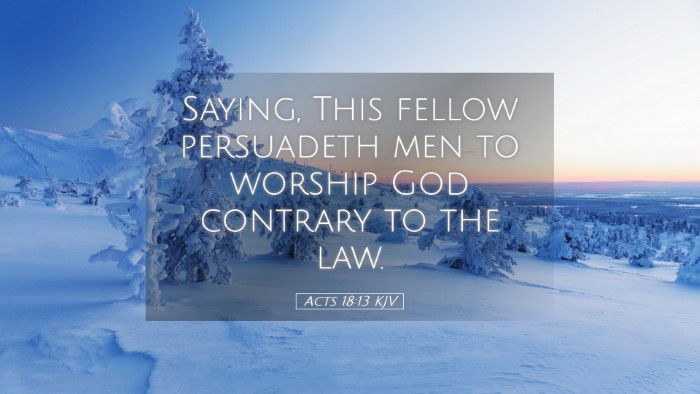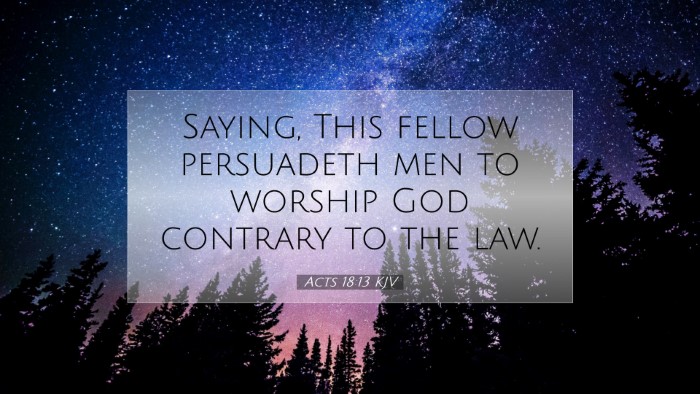Commentary on Acts 18:13
This verse fits into a larger narrative where the Apostle Paul is facing opposition during his missionary journeys. In Acts 18:13, we encounter the critical reaction of the Jews to Paul’s preaching. Understanding this context is essential for gleaning the insights offered by notable public domain commentators like Matthew Henry, Albert Barnes, and Adam Clarke.
Text of Acts 18:13
"Saying, This fellow persuadeth men to worship God contrary to the law."
Contextual Overview
Paul has been in Corinth, engaging with both Jews and Gentiles, when the accusations he faces bring forth a key moment in his ministry. The tension between the early Christian movement and Jewish traditions is palpable in this passage, highlighting both the struggles Paul faced and the overarching theme of the Gospel’s reach beyond Jewish law.
Historical and Cultural Background
The early church had to navigate a complex relationship with Jewish law and traditions. This verse encapsulates a significant conflict: the portrayal of Paul’s teaching as contrary to Jewish law. Understanding the Jewish expectation of the Messiah and the established legal framework helps us appreciate the intensity of the accusations against Paul.
Insights from Commentators
Matthew Henry
Henry emphasizes the nature of the accusation directed at Paul, pointing out that it was not a mere disagreement, but a challenge to the very foundation of Jewish faith and practice. He notes:
- Context of Worship: Paul was accused of persuading men to worship God, which reveals the tension between his message of grace and the Jewish legalism.
- The Legal Implication: Henry observes that the Jews understood the teachings of Jesus and Paul as subversive, posing a direct challenge to Mosaic law.
- Importance of Truth: He highlights Paul’s commitment to truth in the face of false accusations, demonstrating a model of integrity for believers.
Albert Barnes
Barnes delves into the legal ramifications of the accusation made against Paul. He interprets the term "persuades" as an indication that Paul was effectively converting others to Christianity, which the Jews perceived as a direct threat. His insights include:
- Jewish Response: Barnes explains how the Jewish leaders were alarmed due to the rapid spread of Christian belief, which put traditional Judaism at risk.
- Contrary to the Law: The phrase “contrary to the law” suggests not just an interpretation but a legitimate fear that Paul’s teachings could lead to a cultural and religious upheaval.
- Intention Behind Accusation: He posits that the accusation was aimed to incite civic leaders against Paul, showing the intersection of religious and political hostility.
Adam Clarke
Clarke provides a more expansive view regarding the misunderstanding of Paul's message. He notes that the Jews may have misconstrued the essence of Paul’s preaching. His commentary offers several points:
- Misinformation: Clarke argues that the Jews were either willfully ignorant or genuinely confused about the role of the law in light of the Gospel.
- God’s Law vs. Human Tradition: He distinguishes between obedience to God's law and the traditions of men that were often conflated in Jewish debates.
- Reflection on Paul's Mission: Clarke emphasizes that Paul’s intent was never to violate the law but to fulfill it in Christ, thus challenging the very foundations upon which the Jewish leaders stood.
Theological Implications
This verse and its surrounding narrative have profound implications for understanding the development of early Christianity:
- Shift from Law to Grace: The accusations against Paul underscore the radical nature of the Gospel's invitation to both Jews and Gentiles, drawing them toward grace rather than law.
- Enduring Authority of Scripture: As Paul confronts these challenges, it teaches modern believers about the importance of grounding their faith in Scripture while engaging with contemporary society.
- The Role of Persecution: Paul’s experience reflects the reality that faithfulness to God often leads to opposition, a truth applicable throughout church history and into today's world.
Conclusion
Acts 18:13 reveals the struggles of the early church as it sought to establish its identity amidst challenges from both within and without. Matthew Henry, Albert Barnes, and Adam Clarke offer rich insights that help illuminate this pivotal moment. Their teachings encourage modern readers - pastors, students, theologians, and scholars alike - to explore the depths of faith that speak to our own contexts. As we reflect on the complexities of worship, law, and grace showcased in this verse, we are compelled to examine our own relationships with tradition and the transformative power of the Gospel.


